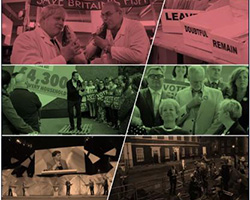13 Jul 2016
Academic report provides early EU Referendum campaign analysis

Academics from the Centre for Research in Communications and Culture have contributed to a publication that captures early reflections on the 2016 EU Referendum.
Loughborough Professors David Deacon, John Downey, James Stanyer and Dominic Wring, and Dr Emily Harmer are amongst 100 of the UK’s leading political and media experts to contribute.
Dominic Wring and colleagues Dr Dan Jackson and Dr Einar Thorsen from Bournemouth University have published EU Referendum Analysis 2016: Media, Voters and the Campaign – a collection of 79 short, accessible pieces capturing the immediate thoughts, reflections and early research insights on the 2016 Referendum. The project was published just 10 days after the Referendum result and has been supported by the Political Studies Association.
In the lead up to the vote determining Britain’s place in the European Union, former Education Minister and Leave campaigner Michael Gove argued that people in this country have had enough of experts.
But the team behind the new publication disagree: “Now more than ever is a time for evidence, expertise and careful reflection. This report has all three in spades,” they said.
Featured authors provide authoritative analysis of the campaign, including research findings and new theoretical insights that offer readers original ways of understanding the referendum and its consequences. Contributions bring a rich range of disciplinary influences, from political science and fan studies to journalism studies and advertising.
The strategy behind the publication and the speed it was produced is explained by the editorial team:
“The academy has an important role to play in contributing to public understanding, to policy discourse, and to the practice of political campaigning, journalism and opinion polling. But one of our collective failures to date has been the speed in which we respond to and intervene in major policy debates or set-piece events such as elections and referendums.
“For us, it is a question of identifying new and innovative ways of producing timely interventions for non-academic audiences.”
The team behind the report is hosting a launch event in Westminster on Monday 18 July from 7.30-9pm which will include a panel discussion on how the media and forms of political communication contributed to people’s engagement with the 2016 EU referendum campaign.
A second free event that brings together some of the UK’s leading researchers in the field to present early reflections on the Brexit campaign is being held in Leicester on Wednesday 27 July as part of the IAMCR pre-conference in Leicester.














